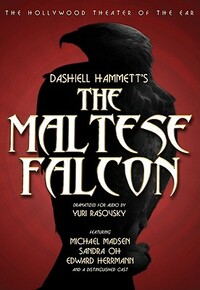You need to sign in or sign up before continuing.
Take a photo of a barcode or cover
adventurous
mysterious
medium-paced
Loveable characters:
Complicated
Great plot and glad I read this classic but even though I knew to expect it, the misogyny, sexism, racism, and homophobic toxic masculinity was distracting.
I wanted to read this because I went to THE john’s grill in sf, and it turned out to be hilaaarious for a 100-year-old book. Even more funny is that John’s grill was mentioned in only one paragraph lol
Having read a compilation of Hammett's earlier in the year, his style and aesthetic was fresh in my mind. The Maltese Falcon does veer into the confusing-murder-explanation-from-Detective-in-real-time arena, but Hammett hits different notes that provide a different vibe, not just procedural. I found that Sam Spade, the detective and protagonist (famously portrayed by Humphrey Bogart), is often caught on his heels throughout the novel. This fallibility is refreshing for a hardboiled novel like this one. He gets confused, shaken, angry, argumentative...there is a lack of control in his machinations that provides a different aspect to the character. Don't get me wrong...there are the same undertones and overtones of sexism and hypermasculinity disguised and effectiveness, but Hammett imbues him with more nuance than he does with his Continental OP character. It makes for a more realistic read.
Did not live up to the hype. I just felt it was really sexist and a little homophobic. The plot was alright and the ending was fine but nothing really wowed me about this book
To start with, I have never seen the movie so I did not have to worry about comparing the book to it.
That being said, I found the book "eh" at most. I went in knowing that the book was written as pulp noir in the 30's so there was going to be a lot of tropes, stereotypes and misogynistic views. Even with all that, I think I may have pulled a muscles from the force of the eye rolls I did throughout the listening.
I pretty much called the it from the start - who did it, why they did it and all that. I can't say I was entertained or have become at all interested in seeing the movie.
There were points where I totally tuned out while listening to the book and realized I honestly did not really care at all what I had missed.
I guess if you like Detective Noir, this is a book for you. But as it's not a genre that I am pulled to, it was not for me.
That being said, I found the book "eh" at most. I went in knowing that the book was written as pulp noir in the 30's so there was going to be a lot of tropes, stereotypes and misogynistic views. Even with all that, I think I may have pulled a muscles from the force of the eye rolls I did throughout the listening.
I pretty much called the it from the start - who did it, why they did it and all that. I can't say I was entertained or have become at all interested in seeing the movie.
There were points where I totally tuned out while listening to the book and realized I honestly did not really care at all what I had missed.
I guess if you like Detective Noir, this is a book for you. But as it's not a genre that I am pulled to, it was not for me.
dark
mysterious
tense
slow-paced
Plot or Character Driven:
Plot
Strong character development:
No
Loveable characters:
No
Diverse cast of characters:
No
Flaws of characters a main focus:
Complicated
*MINOR, INDIRECT SPOILERS*
Even if you excuse the casual misogyny in this book as a product of its time (which I don’t fully, but it does bother me less than if a book came out today written like this), I don’t consider this to be a quality mystery book. I’m rubbish at solving mysteries, so I’m perfectly fine with a mystery that technically pulls the wool over your eyes and not giving you enough information to solve the mystery yourself until the big reveal at the end. But that ending has to feel satisfying for the who/how/whydunit, and along the way keep constantly curious to want to know more.
The way this book presents information is through Spade having conversations with characters as they exposit information to him, and him interjecting a lot of saying he doesn’t believe them or they are lying. The issue with that approach is we are kept kind of a cloud of not knowing what is true and what is false until it is convenient for the book to tell us so, and Spade miraculously is always correct in his hunches. Well, maybe that is a little hyperbole. There is some context of the character’s situation and the direction of the conversation that makes it more likely they are lying, but the way that Spade’s intuition is always correct of when he is 100% certain they are or aren’t, down to the last little detail, makes it hard for me to suspend my sense of disbelief. There was a brief period near the middle of the book that I hoped he had some additional background that could explain why he was so certain, and during that part I was engrossed in the book to try to figure out how he knew so much, but that turned out to be false hope. And the way Spade converses with the other characters I didn’t find that interesting; rather than some wily dialogue to get them to slip up, or some action-packed interrogation, we have him constantly interrupt or argue with the person he is trying to get information from.
As for the events themselves and the characters, all of the perpetrator’s motives felt fairly basic and/or flimsy, and how they were orchestrating everything was fairly uninteresting as well. It’s possible that as being such an old book, the book helped set the foundation for what is considered the basic formula nowadays. But I think it is still valid to compare; if books since have better character motivations for who/whydunit, and more interesting howdunit, just read books since instead. And anyways, Agatha Christie’s novels, some of which were written in around the same period, still felt much more intricate. Or how one character was the backgroundest of background characters I’ve ever seen. Additionally, for something that has remained in pop culture for so long, the titular Maltese Falcon was rather unexciting could have been any expensive object.
Rather than classifying this book as a mystery novel, I would characterize this as more of an escapist fantasy: Sam Spade has lived the hard life but has made his own little P.I. kingdom in his city, would have so much more if the bureaucracy just stopped getting in his way, and has women falling over him left and right.
Even if you excuse the casual misogyny in this book as a product of its time (which I don’t fully, but it does bother me less than if a book came out today written like this), I don’t consider this to be a quality mystery book. I’m rubbish at solving mysteries, so I’m perfectly fine with a mystery that technically pulls the wool over your eyes and not giving you enough information to solve the mystery yourself until the big reveal at the end. But that ending has to feel satisfying for the who/how/whydunit, and along the way keep constantly curious to want to know more.
The way this book presents information is through Spade having conversations with characters as they exposit information to him, and him interjecting a lot of saying he doesn’t believe them or they are lying. The issue with that approach is we are kept kind of a cloud of not knowing what is true and what is false until it is convenient for the book to tell us so, and Spade miraculously is always correct in his hunches. Well, maybe that is a little hyperbole. There is some context of the character’s situation and the direction of the conversation that makes it more likely they are lying, but the way that Spade’s intuition is always correct of when he is 100% certain they are or aren’t, down to the last little detail, makes it hard for me to suspend my sense of disbelief. There was a brief period near the middle of the book that I hoped he had some additional background that could explain why he was so certain, and during that part I was engrossed in the book to try to figure out how he knew so much, but that turned out to be false hope. And the way Spade converses with the other characters I didn’t find that interesting; rather than some wily dialogue to get them to slip up, or some action-packed interrogation, we have him constantly interrupt or argue with the person he is trying to get information from.
As for the events themselves and the characters, all of the perpetrator’s motives felt fairly basic and/or flimsy, and how they were orchestrating everything was fairly uninteresting as well. It’s possible that as being such an old book, the book helped set the foundation for what is considered the basic formula nowadays. But I think it is still valid to compare; if books since have better character motivations for who/whydunit, and more interesting howdunit, just read books since instead. And anyways, Agatha Christie’s novels, some of which were written in around the same period, still felt much more intricate. Or how one character was the backgroundest of background characters I’ve ever seen. Additionally, for something that has remained in pop culture for so long, the titular Maltese Falcon was rather unexciting could have been any expensive object.
Rather than classifying this book as a mystery novel, I would characterize this as more of an escapist fantasy: Sam Spade has lived the hard life but has made his own little P.I. kingdom in his city, would have so much more if the bureaucracy just stopped getting in his way, and has women falling over him left and right.
dark
mysterious
fast-paced
Plot or Character Driven:
Plot
Strong character development:
Yes
Loveable characters:
Yes
Diverse cast of characters:
Yes
Flaws of characters a main focus:
No
not a bad book, a bit overwrought in the dialog, and Hammett's got no time for the ladies, at least not as solid characters (in every sense of the word), but good, nonetheless, and obviously a foundational text in the genre, etc, etc.
dark
mysterious
tense
medium-paced
Plot or Character Driven:
Plot
Strong character development:
No
Loveable characters:
No
Diverse cast of characters:
No
Flaws of characters a main focus:
No





